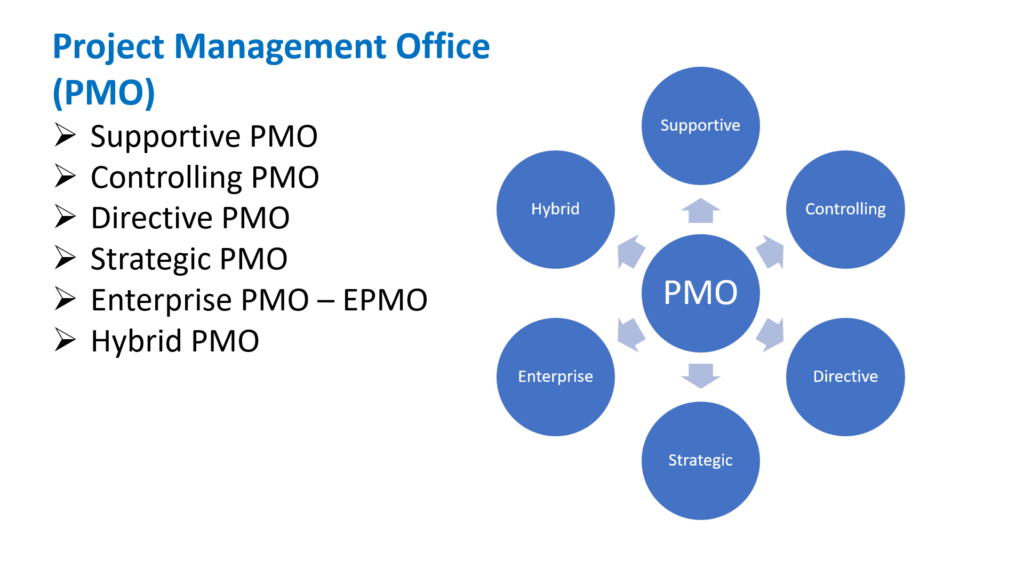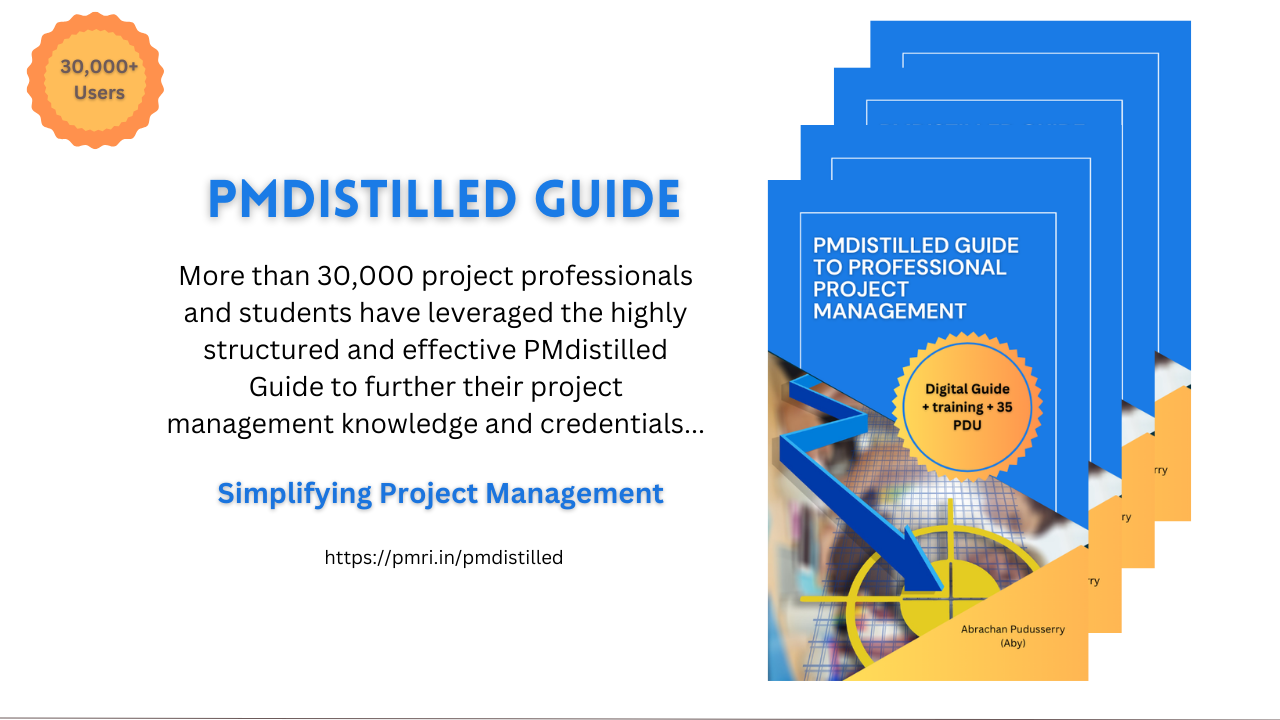Like other functions like HR, Finance, Procurement etc, organizations have a seperate department called project management office (PMO).
“A Project Management Office (PMO) is a centralized organizational unit or department within an organization that is responsible for standardizing project management practices, providing governance, and supporting project managers and project teams in the execution of projects. The primary role of a PMO is to improve the overall effectiveness and efficiency of project management across the organization.”
Different types of PMOs

Key functions and responsibilities of a Project Management Office:
- Standardizing Processes and Methodologies:
- Develop and implement standardized project management processes, methodologies, and best practices.
- Establish templates, tools, and guidelines to support consistent project execution and documentation.
- Define project management standards and ensure compliance with organizational policies and standards.
- Governance and Oversight:
- Provide governance and oversight for projects and project portfolios.
- Define project management policies, procedures, and guidelines.
- Establish project selection criteria, prioritize projects, and allocate resources based on strategic objectives.
- Monitor project performance, milestones, and deliverables to ensure alignment with organizational goals.
- Resource Management:
- Manage project resources, including personnel, budget, and equipment.
- Coordinate resource allocation across projects to optimize utilization and prioritize resource allocation based on project priorities.
- Identify resource constraints and potential bottlenecks and take proactive measures to address resource challenges.
- Training and Development:
- Provide training, coaching, and mentoring to project managers and project teams.
- Develop and deliver project management training programs, workshops, and certification courses.
- Support the professional development of project managers and promote the adoption of best practices and emerging trends in project management.
- Risk Management:
- Facilitate risk identification, assessment, and mitigation activities for projects and project portfolios.
- Establish risk management processes and tools to monitor and manage project risks effectively.
- Provide guidance and support to project managers in developing risk management plans and strategies.
- Communication and Reporting:
- Facilitate communication and collaboration among project stakeholders, including project managers, team members, sponsors, and senior leadership.
- Develop and maintain communication channels, reporting mechanisms, and dashboards to keep stakeholders informed about project status, progress, and key milestones.
- Prepare and distribute regular reports, updates, and presentations on project performance and portfolio health.
- Continuous Improvement:
- Monitor project management practices and processes to identify areas for improvement.
- Collect feedback from project managers, stakeholders, and project teams to identify lessons learned and best practices.
- Implement continuous improvement initiatives to enhance project management capabilities and drive organizational excellence.
Overall, a Project Management Office plays a critical role in driving organizational success by providing governance, support, and oversight for projects and project portfolios. By standardizing processes, facilitating communication, and promoting best practices, a PMO helps organizations achieve their strategic objectives and deliver value to stakeholders.
Different types of PMO
Project Management Offices (PMOs) can vary significantly in their structure, functions, and roles within organizations. The type of PMO established often depends on the organization’s size, industry, culture, and strategic objectives. Here are the different types of PMOs commonly found:
- Supportive PMO:
- A supportive PMO provides support and guidance to project managers and teams but typically has limited authority over projects.
- It offers templates, tools, training, and best practices to assist project managers in their project management activities.
- The primary role of a supportive PMO is to facilitate project success by providing resources and expertise as needed.
- Controlling PMO:
- A controlling PMO has a higher level of authority and control over project management processes and practices.
- It establishes standards, policies, and procedures for project management and enforces compliance across projects.
- A controlling PMO may conduct project reviews, audits, and assessments to ensure projects adhere to established standards and guidelines.
- Directive PMO:
- A directive PMO takes a more active role in project management by directly managing projects or project portfolios.
- It may assume responsibility for project delivery, resource allocation, and decision-making on behalf of the organization.
- Directive PMOs often have significant authority and influence over project outcomes and strategic direction.
- Strategic PMO:
- A strategic PMO focuses on aligning projects and project portfolios with the organization’s strategic objectives and goals.
- It plays a key role in portfolio management, project selection, and resource allocation to ensure projects deliver maximum value to the organization.
- A strategic PMO works closely with senior leadership to define strategic priorities and ensure projects support the organization’s overall strategy.
- Enterprise PMO (EPMO):
- An Enterprise PMO (EPMO) is a centralized unit that oversees project management activities across the entire organization.
- It provides strategic direction, governance, and support for project management practices and initiatives.
- An EPMO may encompass multiple types of PMOs (supportive, controlling, directive) and focus on driving organizational excellence in project management.
- Hybrid PMO:
- A hybrid PMO combines elements of different PMO types to meet the specific needs and requirements of the organization.
- It may incorporate supportive, controlling, and directive functions based on project complexity, organizational culture, and strategic objectives.
- A hybrid PMO offers flexibility and customization to adapt to changing circumstances and evolving project management practices.
The choice of PMO type depends on various factors, including the organization’s maturity level in project management, the degree of centralization desired, the level of control needed, and the strategic alignment of projects with organizational goals. Regardless of the type, a well-functioning PMO can significantly contribute to improved project delivery, increased efficiency, and enhanced organizational performance.

